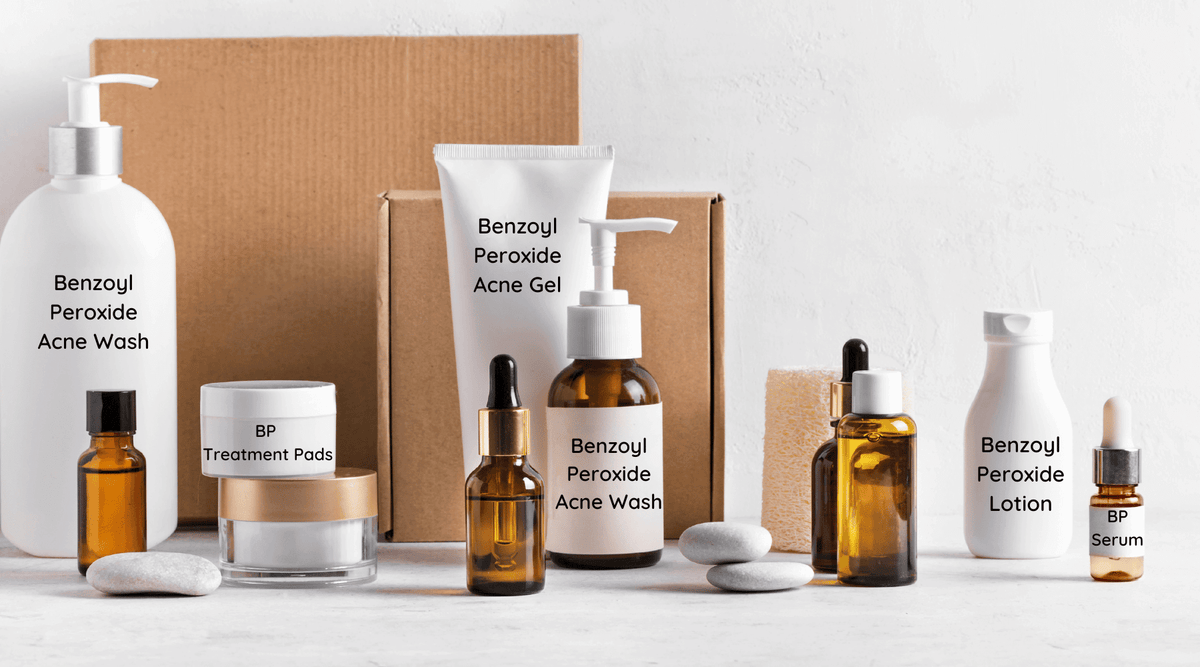

Are you tired of battling acne? Struggling with stubborn breakouts that seem to have a mind of their own? Well, worry no more, because there's a powerful ally in your skin care arsenal: benzoyl peroxide. In this post, we'll dive deep into benzoyl peroxide benefits, its uses, and even explore some common questions you might have about this skin care superhero and other acne treatments.
Esthetician Approved Skin Care
Written by a licensed esthetician with 17 years experience and a passion for skin care.
We believe in healthy skin care and non-toxic ingredients.
Table of Contents
Benzoyl Peroxide Benefits: A Blessing for Troubled Skin
Here are some of the incredible benefits benzoyl peroxide brings to the table:
- Clears Acne: Benzoyl peroxide is renowned for its effectiveness in treating acne. It works by killing acne-causing bacteria and reducing inflammation, effectively clearing up breakouts and preventing future ones.
- Unclogs Pores: Say goodbye to pesky blackheads and whiteheads! Benzoyl peroxide penetrates deep into the pores, helping to remove excess oil and debris, and keeping them clear.

-
Reduces Inflammation: Benzoyl peroxide not only combats acne but also effectively reduces inflammation, contributing to a clearer, smoother complexion. Its dual action makes it a valuable ally in the quest for healthy skin.
- Prevents Breakouts: Consistent use of benzoyl peroxide can help prevent future breakouts by keeping your pores clear and controlling excess oil production.
Common Uses for Benzoyl Peroxide
- Daily acne treatment
- Prevention of future breakouts
- Treatment for body acne, including on the chest and back
- Adjunct therapy for conditions like rosacea
- Spot treatment for individual blemishes

Benzoyl Peroxide: What Does It Do?
In a nutshell, benzoyl peroxide is a potent acne-fighting ingredient that works by killing acne-causing bacteria, unclogging pores, and reducing inflammation, ultimately leading to clearer, smoother skin.
Benzoyl Peroxide Before and After: See the Transformation
Pictures speak louder than words, and the before-and-after photos of benzoyl peroxide users tell a compelling story of transformation. From severe acne to clear, radiant skin, the difference is truly remarkable.
Adapalene and Benzoyl Peroxide Gel Before and After: A Winning Combination
Combining adapalene with benzoyl peroxide can supercharge your acne treatment routine. Adapalene works to unclog pores and prevent new acne formation, while benzoyl peroxide tackles existing blemishes. Together, they make a dynamic duo for fighting acne and achieving smoother, clearer skin.
"Always apply a moisturizer after using benzoyl peroxide with adapalene or salicylic acid to prevent dryness or irritation"
Using Benzoyl Peroxide and Salicylic Acid: A Match Made in Skin Care Heaven
Salicylic acid is another powerhouse ingredient in the fight against acne. When used alongside benzoyl peroxide, it can provide comprehensive treatment by exfoliating the skin, unclogging pores, and reducing inflammation. Just remember to introduce them gradually to avoid over-drying or irritation.

Benzoyl Peroxide and Hyaluronic Acid: Finding the Balance
While benzoyl peroxide is fantastic for treating acne, it can be drying for some skin types. That's where hyaluronic acid comes in. This hydrating ingredient helps to replenish moisture and maintain skin's natural barrier, ensuring that your skin stays balanced and healthy while using benzoyl peroxide.
Ensuring Safety: The Valisure Study and Petition to the FDA
Recent concerns raised by the Valisure study regarding benzoyl peroxide's potential impurities have sparked discussions about its safety and quality, especially when stored at hot temperatures. However, it's essential to note that benzoyl peroxide has been extensively studied and deemed safe and effective for acne treatment by regulatory bodies worldwide. The FDA continuously monitors skincare ingredients to ensure consumer safety.
Benzoyl peroxide can break down into carcinogen benzene at temperatures above 122°F.
In addition to concerns about impurities, proper storage of benzoyl peroxide is crucial. Storing it in the refrigerator can help maintain its stability and efficacy over time. By keeping it in a cool, dark place, you can ensure that your benzoyl peroxide remains safe and effective, providing you with the best possible results in your skincare routine.

Alternatives to Benzoyl Peroxide: Exploring Other Options for Acne Treatment
While benzoyl peroxide is undoubtedly a powerhouse ingredient in the fight against acne, it's not the only player on the field. Here are some alternative treatments worth considering:
- Retinoids: Topical retinoids, such as adapalene and tretinoin, are derived from vitamin A and work by promoting cell turnover and preventing the plugging of hair follicles (AKA pores). They're effective for treating both comedonal (blackhead and whiteheads) and inflammatory acne and can also improve the overall texture and appearance of the skin.

-
Salicylic Acid: This beta hydroxy acid (BHA) is renowned for exfoliating the skin, unclogging pores, and acting as an antiseptic. Particularly effective against blackheads and whiteheads, it dissolves the outer layer of skin cells, preventing pore blockages and reducing acne-causing bacteria, ultimately preventing breakouts.
- Glycolic Acid: As an alpha hydroxy acid (AHA), glycolic acid exfoliates the skin, helps to unclog pores, and reduces inflammation. It can be particularly beneficial for those with acne-prone and oily skin types, as it helps to regulate oil production and prevent new breakouts.
Did you know? Glycolic acid is made from sugarcane and it's the strongest alpha hydroxy acid (AHA).
-
Sulfur: Sulfur has anti-inflammatory and antibacterial properties, making it an effective treatment for acne. It works by reducing the production of sebum and preventing the growth of acne-causing bacteria. Sulfur also helps to exfoliate the skin and remove dead skin cells, keeping pores clear.
- Tea Tree Oil: This natural ingredient has antimicrobial and anti-inflammatory properties, making it effective for treating acne. It can help reduce the number of acne lesions and improve overall skin texture. However, it's essential to dilute tea tree oil properly, as it can cause irritation if used at full strength.

- Azelaic Acid: Azelaic acid is a naturally occurring acid that helps to unclog pores, reduce inflammation, and kill acne-causing bacteria. It's effective for treating both inflammatory and non-inflammatory acne and can also help fade post-inflammatory hyperpigmentation.
When choosing an alternative to benzoyl peroxide, it's essential to consider your skin type, the severity of your acne, and any potential side effects. Consulting with a dermatologist can help you determine the best treatment plan for your individual needs.
🤩
Do you want product recommendations?
This skin care quiz can help make your glow up a success!
Benzoyl Peroxide on Armpits: Yes, It Works!
Did you know that benzoyl peroxide can also be used to treat acne on the body, including the armpits? Its antibacterial properties make it an effective solution for body acne, helping to clear up those stubborn bumps and blemishes.

Expired Benzoyl Peroxide: To Toss or Not to Toss?
While using expired skin care products isn't ideal, benzoyl peroxide tends to remain stable for long periods of time when stored at low temperatures. However, it's always best to check the expiration date and replace any expired products to ensure optimal efficacy and safety.
Summary: Benzoyl Peroxide Benefits at a Glance
Benzoyl peroxide effectively clears acne by targeting bacteria and unclogging pores.
It reduces redness and inflammation associated with breakouts, promoting clearer skin.
Benzoyl peroxide prevents future breakouts by maintaining clear pores, offering long-term acne control.
Explore alternative options like salicylic acid, retinoids, glycolic acid, sulfur, tea tree oil, and azelaic acid for personalized acne treatment plans.
Consulting a dermatologist can help determine the most suitable approach tailored to individual skin needs.
In conclusion, benzoyl peroxide is a game-changer for anyone struggling with acne. With its powerful acne-fighting properties and proven effectiveness, it's no wonder that it's a staple ingredient in many skin care routines. So say goodbye to breakouts and hello to clear, radiant skin with benzoyl peroxide!

FAQs: Your Burning Questions, Answered
Is benzoyl peroxide good for everyday use?
Yes, benzoyl peroxide can be used daily as part of your skincare routine. Start with a lower concentration and gradually increase to minimize potential irritation.
Can benzoyl peroxide remove dark spots?
Benzoyl peroxide primarily targets acne lesions and may not be as effective for removing dark spots. Consider using other treatments like retinoids or chemical peels for dark spot removal.
What's better, benzoyl peroxide or salicylic acid?
Both benzoyl peroxide and salicylic acid are effective acne treatments, but they work in different ways. Benzoyl peroxide kills bacteria and unclogs pores, while salicylic acid exfoliates the skin and helps to prevent pore blockages. The choice between them depends on individual skin needs and preferences.
What not to mix with benzoyl peroxide?
Avoid combining benzoyl peroxide with other active ingredients like retinoids or chemical exfoliants, as this can increase the risk of irritation and dryness. It's also essential to avoid using benzoyl peroxide with products containing vitamin C, as they may reduce its effectiveness.
Can I apply benzoyl peroxide on a popped pimple?
It's not recommended to apply benzoyl peroxide on an open or popped pimple, as it can cause further irritation and increase the risk of infection. Instead, focus on gentle cleansing and applying a spot treatment specifically designed for open lesions.
Can I leave benzoyl peroxide on my face overnight?
Yes, benzoyl peroxide can be left on the face overnight. However, if you experience excessive dryness or irritation, consider using it for shorter periods or reducing the frequency of application. Always follow the recommendations provided by your dermatologist or skincare professional.







